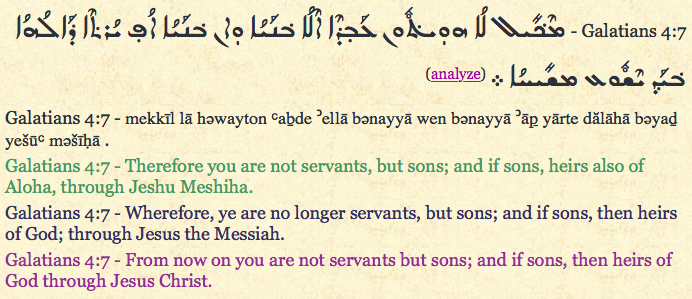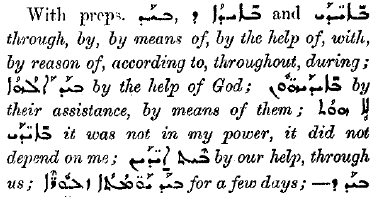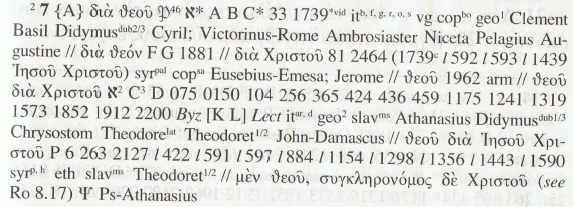This is the eighth of what I plan to be ten posts in which I examine, one by one, Brian Simmons’ claims to be translating from the Aramaic in certain verses of his so-called ‘Passion Translation’. My current intention is to look at the first ten such claims in Letters from Heaven, and then take stock. For more on my purpose and methodology see here and here.
Galatians 4.7
ὥστε οὐκέτι εἶ δοῦλος ἀλλ’ υἱός· εἰ δὲ υἱός, καὶ κληρονόμος διὰ θεοῦ. [NA 28]
So you are no longer a slave, but a son, and if a son, then an heir through God. [ESV]
ωστε ουκετι ει δουλος αλλ υιος ει δε υιος και κληρονομος θεου δια χριστου [Byzantine/Majority Text]
Therefore you are no longer a slave but a son, and if a son, then an heir of God through Christ. [NKJV]
Note that NA 28 has διὰ θεοῦ at the end of the verse, while the Robinson/Pierpont Majority Text has διὰ Χριστοῦ.
Simmons:
In the second sentence, to which the endnote may perhaps be expected to apply in particular, we see two major changes from the usual translations. First, there is the idea of access rather than that of inheritance. Second, there is the idea of being one with Jesus Christ, rather than gaining an inheritance from God through Jesus Christ. We might therefore expect to see ideas of this sort in the Aramaic text if Simmons is indeed translating from it as he claims.
Here is the Western UBS Peshitta text from dukrhana.com with transliteration and three English translations by Etheridge (green), Murdock (navy), and Lamsa (purple):
It can be seen that the English translations are nearly the same as the normal translations of the original Greek text, the only difference being the fuller name given to the Lord Jesus.
The word ܝܳܪܬ݁ܶܐ simply means ‘heirs’, as shown in Jennings:
and in Payne Smith:
The word ܒ݁ܝܰܕ݂ (b’yad) is composed of the preposition ܒ (b’) meaning ‘in’, but also sometimes ‘by’, among other meanings, and ܝܕ (yad), meaning ‘hand’. The meaning of the composite word is given under the lexical entry for ܝܕ in both Jennings and Payne Smith. Jennings has it as ‘by means of’, ‘by’, ‘through’:
and Payne Smith similarly as ‘through’, ‘by means of, ‘by the help of’ and so on:
It can be seen that the Aramaic text is very similar to the Greek and that neither the idea of access, nor that of oneness with someone, or to be found in it. All that remains is that Simmons may have derived his ‘Jesus the Anointed One’, in place of ‘God’ (NA28, ESV) or ‘Christ’ (Byzantine/Majority, NKJV) from it. But this is of rather minor significance, it seems to me, in comparison to these two substantial changes in meaning. As it happens, there are also Greek manuscripts with διὰ Ἰησοῦ Χριστοῦ at the end of the verse, as can be seen in the penultimate variant in the apparatus for the verse in the UBS Greek New Testament (5th Revised Edition):
I conclude that Simmons is hardly justified in claiming that his rendering of the verse is derived from the Aramaic.
Andrew






One Comment